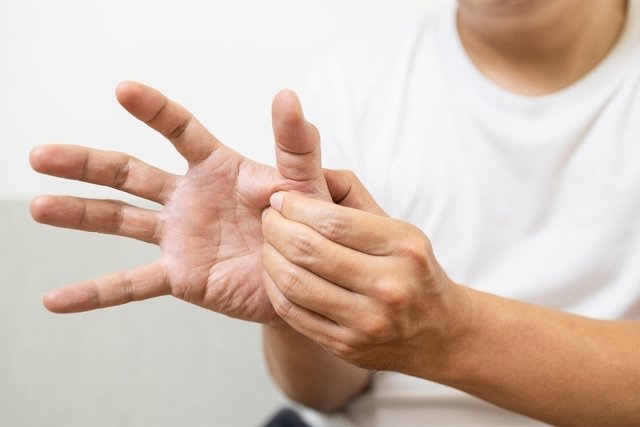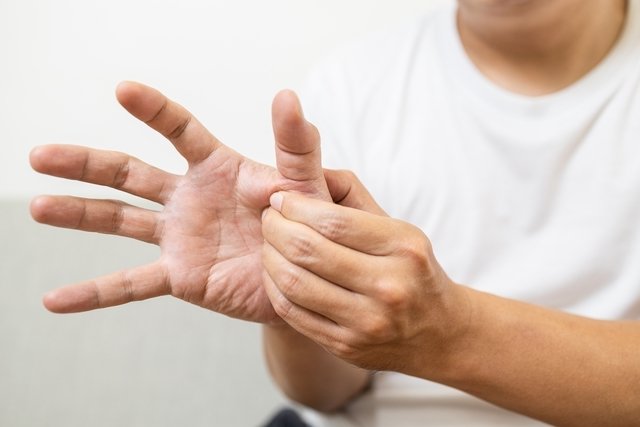Beriberi is a nutritional disease caused by a lack of vitamin B1 (thiamine), which causes symptoms such as muscle cramps, double vision or constipation. Furthermore, over time, the risk of developing cardiovascular diseases and/or neurological changes increases.
Although beriberi can occur due to a decrease in the consumption of foods rich in vitamin B1, such as brewer’s yeast, cashews, peanuts or beans, it can also occur due to excessive consumption of alcohol or simple carbohydrates, such as cassava, rice or refined wheat flour. , ending up being more common in people who are overweight or obese.
Vitamin B1 is responsible for carbohydrate metabolism, energy production and influences cell functions and growth, with consumption of 1.1 to 1.2 mg per day being recommended. Find out more about the importance of vitamin B1 for the body.

Beriberi symptoms
The main symptoms of beriberi are:
- Lack of appetite;
- Weakness and irritability;
- Muscle cramps;
- Tingling in the hands and/or feet;
- Heart palpitations;
- General malaise;
- Constipation;
- Memory problems;
- Insomnia;
- Excessive tiredness.
In children, symptoms of colic, vomiting, agitation and shortness of breath may also appear. It is important to remember that this disease can also occur in overweight or obese people, who appear to be well nourished.
How the diagnosis is made
The diagnosis of beriberi is made by a general practitioner or gastroenterologist by evaluating the signs and symptoms presented, as well as evaluating eating habits.
However, to confirm the disease, it is recommended to measure vitamin B1 in order to check the levels of this vitamin in the body and, thus, it is also possible to assess the severity of the disease and initiate the most appropriate treatment.
Main causes
The main causes of a lack of vitamin B1 in the body are:
- Consumption of foods rich in carbohydrates, such as refined white rice, sugar, white flour, as this increases the body’s need for this vitamin;
- Alcoholism;
- Natural increase in need, such as during pregnancy, breastfeeding or intense physical activity;
- Changes in the liver;
- Prolonged diarrhea;
- Presence of diseases such as cancer, hyperthyroidism and liver problems;
- Hemodialysis and use of diuretic medications.
Because it is soluble in water, most vitamin B1 is lost during cooking, especially when the cooking water is discarded.
How the treatment is carried out
The treatment of beriberi is carried out according to the instructions of the doctor or nutritionist, and the use of vitamin B1 supplements is normally recommended, which must be taken for at least 6 months, in addition to also recommending the elimination of alcohol consumption and changes in diet.
Therefore, to help treat and prevent the disease, the consumption of foods rich in this vitamin should be increased, such as oat flakes, sunflower seeds or brewer’s yeast, giving preference to whole foods rather than refined foods, such as rice, flour and whole wheat pasta. See the complete list of foods rich in vitamin B1.
Possible complications
If beriberi is not treated properly, it can cause complications, heart and liver growth, pulmonary edema, heart failure, reduced sensitivity and muscle strength, double vision and neurological problems, including delirium and memory loss. Furthermore, it is important to remember that in more advanced cases, treatment is not enough to cure muscular and neurological changes, but must be done to prevent the disease from worsening.
Bibliography
- MINISTRY OF HEALTH – SECRETARIAT OF PRIMARY HEALTH CARE. Actions to combat Beribéri. Available at: <https://aps.saude.gov.br/ape/pcan/faqberiberi>. Accessed on Feb 3, 2022
- CIRQUEIRA JUNIOR, Valdeon Caetano R.; CARVALHO, Ana Lúcia MM; CIRQUEIRA, Grazziela V. Case report: thiamine deficiency as a cause of cardiac decompensation. Acta Biomedica Brasiliensia. Vol 8. 2 ed; 135-139, 2017
- BARRETO, Tárcia Milene AC; BARRETO, Fabrício. Characterization of beriberi cases among indigenous people in Northern Brazil. HEAL. Vol 15. 2 ed; 104-111, 2016

Sign up for our newsletter and stay up to date with exclusive news
that can transform your routine!
Warning: Undefined array key "title" in /home/storelat/public_html/wp-content/plugins/link-whisper-premium/templates/frontend/related-posts.php on line 12
Warning: Undefined array key "title_tag" in /home/storelat/public_html/wp-content/plugins/link-whisper-premium/templates/frontend/related-posts.php on line 13





